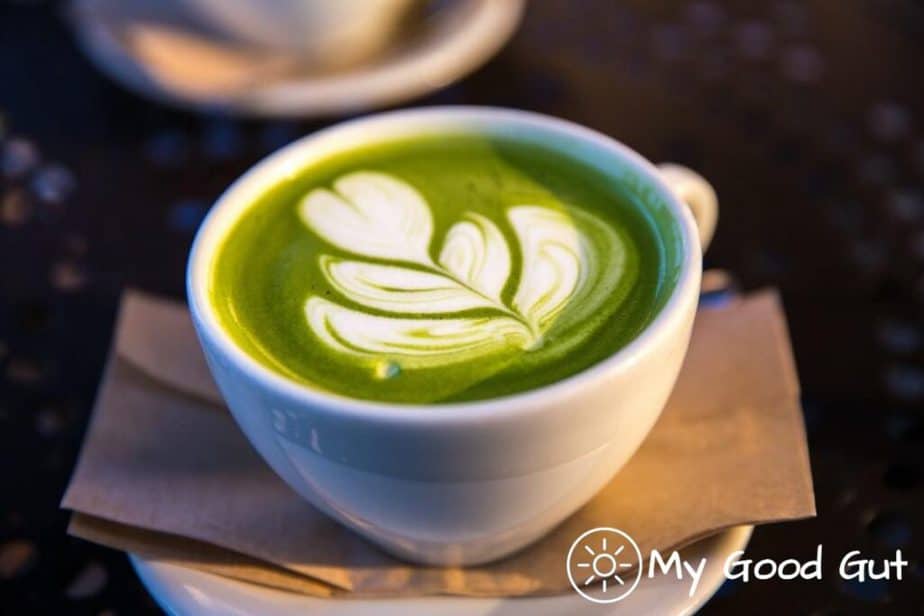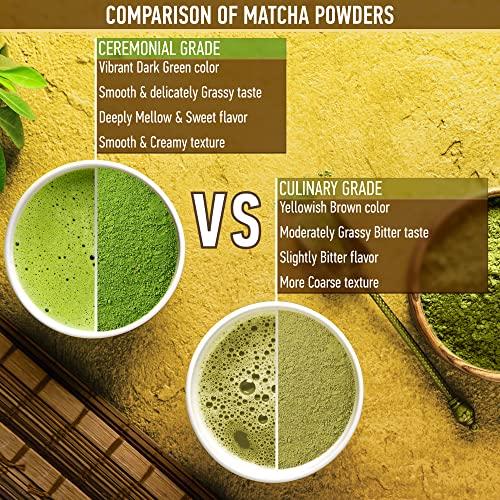Green tea is a popular drink that can be found in many homes and shops, because it comes with many health benefits.
But is green tea beneficial for people with IBS symptoms? Or will green tea cause more problems?
There are mixed reviews about the usefulness of green tea and Irritable Bowel Syndrome (IBS). But it’s possible to get the green tea benefits, while still minimizing irritation from the tea, by drinking decaf green tea.
That doesn’t mean you can go out and drink as much as you want though. I’ll cover the Good and Bad of Green Tea for IBS, so you understand what the limits are.
Here are a couple of good decaf green tea options. The first is a decaf matcha green tea. Matcha is known to have 3 times as many antioxidants as regular green tea.
The second is regular decaf green tea.
Let’s first understand what Green Tea is, because there might be some common misconceptions of what it is.
What is Green Tea?
Green tea accounts for 20% of all the tea produced in the world. Other teas include black tea, white, yellow, and oolong tea.
All the teas are produced from the leaves of the Camellia sinensis plants, but what makes them different is how the leaves are ultimately processed and oxidized. Black teas fully oxidized, while green tea has zero oxidation.
Green tea also contains a compound called EGCG, which is a catechin that helps with stomach issues and chronic inflammation. Catechins are natural antioxidants that help fight free radicals.
Studies have shown that green tea has many health benefits and can help with weight loss, cancer prevention, high blood pressure, and even improving brain functions.
So with all those benefits, it could surely help IBS symptoms, right? There’s also one thing that green tea contains – caffeine.
Is Green Tea Bad for IBS?
Caffeine is known to be a bowel irritant, since it increases the movement of the bowels. As an IBS sufferer, you definitely do not want to irritate your gut any further than it may already be suffering from.
Instead, you want to perform the opposite of this, which is to soothe the gut to ensure that it is rested and able to heal.
Green tea isn’t on the high end of caffeine content in drinks, including against other teas. Check out this short list of drinks and their caffeine content. Keep in mind that 400 milligrams (mg) is the suggested safe level for most adults.
- Learn More: Best Teas for IBS
| Drink | Size in Oz.(mL) | Caffeine (mg) |
| Coffee, Brewed | 8 oz (236.59 mL) | 96 |
| Coffee, Brewed Decaf | 8 oz (236.59 mL) | 2 |
| Coffee, Espresso | 2 oz (59.15 mL) | 128 |
| Brewed Tea, Black | 8 oz (236.59 mL) | 47 |
| Brewed Tea, Green | 8 oz (236.59 mL) | 28 |
| Brewed Tea, Green Decaf | 8 oz (236.59 mL) | 2 |
| Cola | 8 oz (236.59 mL) | 22 |
| Energy Drink | 8 oz (236.59 mL) | 29 |
While green tea is on the lower end of the caffeinated drinks, you can see that it’s still a high enough amount and basically the same as an energy drink. IBS sufferers should be staying away from caffeinated drinks.
Is it possible to reap the benefits of green tea or do we avoid tea altogether?
Luckily, there’s an option – Hot Decaffeinated Green Tea.

Is Green Tea Good for IBS?
Decaf green tea will still give you the benefits of green tea without the caffeine. You’ll get the antioxidants and anti-inflammatory properties that green tea is famous for and I mentioned earlier.
Green tea’s benefits are further heightened when served hot. Hot tea is more water soluble than cold tea, so it’s more effective in passing the benefits on.
Humans are also warm-blooded, so it’s far easier for our bodies to take-in similar temperature liquids. Most IBS sufferers have a weaker intestinal environment, so drinking lukewarm to hot drinks is better than cold fluids.
When consuming cold fluids, it’s a mini-shock to the intestinal environment and the body needs to generate the heat necessary to warm up the fluids.
This further takes away from your core set of inner energy, which could have been used to enable your body to recuperate further. Instead, it’s recuperating from the cold fluids by warming it up.
How Much Green Tea Can I Drink and When?
To get all the benefits of green tea, you don’t have to drink much at all. 1-2 cups of decaffeinated green tea per day, preferably in the morning and night, is all you need.
Remember to drink lots of water throughout the day to help cleanse and flush out wastes from your body. It can also help to reduce water retention in people with IBS.
Our bodies are made up of 55-75% water, so it only makes sense to drink plenty of water to keep the balance in our body. The more water we drink, the more effective the body is in cleaning out waste and toxins – especially for people with IBS.
However, try not to exceed 8 cups of water a day unless you are in a very hot climate, as you can actually wash out your internal mineral sources.
There is a fine balance in the overall scheme of things. Similarly, like the daily intake limit of green tea and IBS, everything in moderation is best.
Is Matcha Good for IBS?
Matcha green tea is a great option for IBS. It contains three times as many antioxidants as normal green tea. But that doesn’t mean you should run out and get matcha right away.
It might be best to first try regular decaf green tea and see how your IBS symptoms are. Then work your way to matcha if you’re not seeing any irritation or adverse side effects.
Alternatives to Green Tea for IBS Sufferers
While green tea is sought after for its health benefits, some IBS sufferers might seek alternatives, especially due to its caffeine content.
Here are a few options to consider:
- Herbal Teas: Teas like chamomile, peppermint, and ginger are caffeine-free and can be soothing for the gut. They can be a great alternative for those sensitive to caffeine.
- Decaffeinated Green Tea: This offers the flavor and some benefits of green tea without the caffeine. It’s a suitable option for those who enjoy green tea but want to avoid caffeine.
- White Tea: A less processed tea, white tea contains lower caffeine levels than green tea and might be gentler on the stomach for some IBS sufferers.
There are many other teas out there that people with IBS will try: peppermint tea, chamomile tea, fresh ginger tea, and others that are part of the FODMAP diet plan.
The Ancient Brew: A Brief History of Green Tea
Green tea, revered for its myriad health benefits, traces its roots back to ancient China, over 4,000 years ago.
Legend has it that Emperor Shen Nong discovered green tea when a stray leaf blew into his pot of boiling water. Since then, green tea has woven itself into the tapestry of Asian culture, from traditional ceremonies in Japan to medicinal uses in ancient Chinese dynasties.
Its popularity spread across continents, and today, it’s celebrated globally not just for its delicate flavor but also for its potential health benefits.
The unique processing of green tea, where the leaves are not fermented but rather steamed or pan-fried, helps retain its rich color and potent antioxidants.
Final Thoughts on Green Tea and IBS
Is Green Tea good for IBS?
It’s a popular question because it’s such a popular drink due to its many health benefits. Don’t be afraid to drink green tea, but do drink the decaf version for less risk of irritation.
Here are two popular decaf green teas out there.
Green tea, with its rich history and numerous health benefits, can be a delightful addition to many people’s diets. And remember, there are always alternatives available if you’re more sensitive.
Whether you choose traditional green tea, its decaffeinated version, or a completely different herbal brew, the key is to find what works best for your unique body and needs.”
For other articles on IBS:



